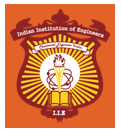THE ACADEMIC PROGRAMME OF THE INSTITUTION MAINLY CONSISTS OF SECTIONS ‘A & B’ EXAMINATIONS, POPULARLY KNOWN AS THE AMIIE EXAMINATION.
AMIIE in Structural Engineering
Information For:
- Home
- Examination
- R&D
- Application Status
- Apply Membership Online
- RTI Information & Reply
- Awards
- Become Student's Chapter
- Online Verification
- Placement Service
- Alumni Association
- Approval & Recognition
- AMIIE(B.Tech./B.E.)
- DIPIIE-DMIIE-TMIIE(Diploma)
- List of Student's Chapter
- Our Vision
- Circular/Notice/Tender
- Hall Ticket
- Examination Result
- Vacancy & Career
- Global Linkage
- Downloads
Key Highlights of the AMIIE
- Project based learning through industry collaborations.
- Focus on skill building & practical implementations.
- Interactive sessions with industry experts through Student's Chapter.
About
Structural engineers design and maintain the framework of buildings and structures, ensuring safety and stability. They work alongside architects to create everything from homes to skyscrapers. With innovative solutions, they address challenges in diverse environments. Certified by The Institution of Structural Engineers, these professionals are committed to continuous development, maintaining high standards in the field.
Career
A career in structural engineering offers diverse opportunities, with professionals engaged in designing and maintaining infrastructure like bridges, buildings, and tunnels. Structural engineers work on large-scale projects, from residential buildings to skyscrapers, and are crucial in ensuring public safety. They collaborate with architects, contractors, and urban planners to deliver safe and sustainable structures. This field requires strong problem-solving skills, creativity, and technical expertise in areas like materials science, statics, and dynamics.
To succeed in structural engineering, one must have a deep understanding of engineering principles, mathematics, and physics. Professional engineers must also stay up to date with advancements in construction technology and regulations. Specializations within structural engineering include areas such as seismic design, transportation structures, and steel or concrete construction.
With a B.Tech in Civil or Structural Engineering, entry-level engineers can work as design engineers, project engineers, or site engineers. As they gain experience, they can move into senior roles like project manager, consultant, or even start their own engineering firms. The career path offers opportunities in both public and private sectors, with significant room for advancement.
Job Prospects
Diverse Industries: Opportunities in construction, transportation, and energy sectors.
High Demand: Growing need for professionals in urban development and infrastructure.
Public and Private Jobs: Roles in both government and private companies.
Global Opportunities: Opportunities to work internationally in growing economies.
Remuneration
The remuneration for structural engineers varies based on experience, location, and employer. Entry-level engineers can expect to earn between ₹25,000 to ₹40,000 per month. With 5-10 years of experience, salaries typically range from ₹50,000 to ₹80,000 per month. Senior-level engineers or those in specialized roles can earn upwards of ₹1,00,000 per month. Structural engineers working internationally often receive significantly higher salaries due to the global demand for their expertise.
Section-A
- MATHEMATICS III
- WATER AND WASTE WATER ENGINEERING
- HYDRAULICS
- BRIDGE ENGINEERING
- SURVEYING - I
- SOCIETY, ENVIRONMENT ENGINEERING
- BUILDING CONSTRUCTION
- STRUCTURAL ANALYSIS
- COMPOSITE MATERIALS & STRUCTURES
Section-B
- SOLID MECHANICS
- DESIGN OF R.C STRUCTURES
- FOUNDATION ENGINEERING
- THEORY OF ELASTICITY AND PLASTICITY
- HYDROPOWER ENGINEERING
- OPERATION RESEARCH
- DESIGN OF STEEL STRUCTURES
- ADVANCED STRUCTURAL ANALYSIS
- ENVIRONMENTAL ENGINEERING
- ADVANCED FOUNDATION ENGINEERING
- INDUSTRIAL ECONOMICS AND MANAGEMENT
- REPAIR & REHABILITATION OF STRUCTURES
- PRESTRESSED CONCRETE & ADVANCED DESIGN OF STRUCTURE
- EARTHQUAKE ANALYSIS & DESIGN OF STRUCTURES
- FINITE ELEMENTS METHOD OF CIVIL ENGINEERING
- VALUATION OF REAL PROPERTY
- WATER RESOURCE SYSTEM & PLANNING
- HIGHWAY MAINTENANCE & MANAGEMENT SYSTEM
- PROJECT WORK
What Is AMIIE?
Full form of AMIIE is “Associate Member of the Indian Institution of Engineers”. AMIIE is a professional certification given by Indian Institution of Engineers (IIE).

